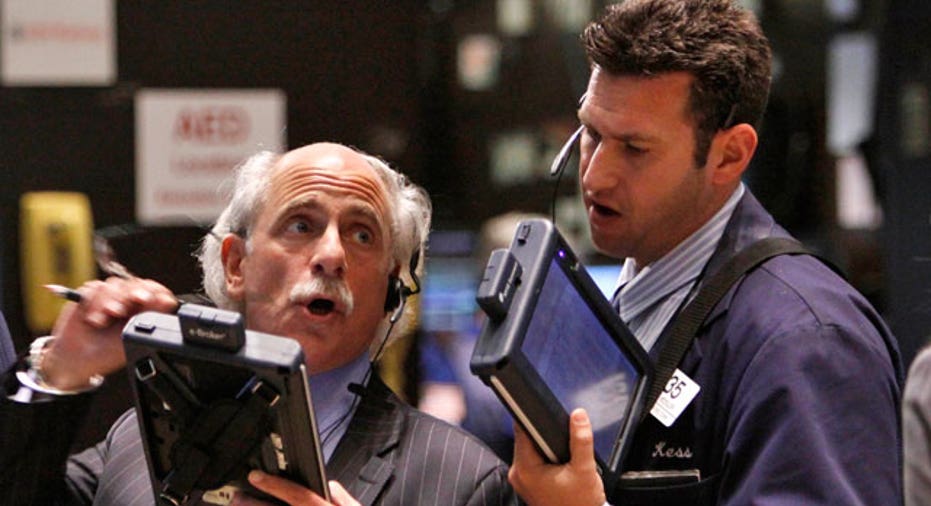Greek Jitters Quash Rally; Stocks Turn Sharply Lower

FOX Business: The Power to Prosper
After rallying in early trading, the markets took a sharp turn to the downside on Wednesday afternoon amid worries disagreements among European policymakers may hinder Greece's next round of rescue aid.
Today's Markets
As of 3:49 p.m. ET, the Dow Jones Industrial Average fell 186 points, or 1.6%, to 11,011, the S&P 500 dipped 24 points, or 2%, to 1,151 and the Nasdaq Composite dropped 52.1 points, or 2%, to 2,494.
Materials shares took some of the steepest declines, but every sector was in the red. Aluminum-giant Alcoa (NYSE:AA), was the worst-performing Dow component, along with DuPont (NYSE:DD) and 3M (NYSE:MMM). Blue chips like American Express (NYSE:AXP) and Microsoft (NYSE:MSFT) struggled to hang on to small gains.
Technology shares were out-performing the broader markets. Indeed, online retailer Amazon.com (NASDAQ:AMZN) also saw its shares soar after it unveiled a new tablet designed to tap into the quickly-growing marketplace and a much lower price than the super-popular Apple (NASDAQ:AAPL) iPad, and updates to its e-reader.
The European sovereign debt crisis has captivated the markets over the past two weeks as small developments on that front have often caused wild swings in stock prices both domestically and abroad. The worry among analysts has been that if Greece, which has nearly half a trillion dollars in public debt, were to default, it could ignite a cascading financial event not unlike the Lehman Brother bankruptcy, potentially harming an already weak global financial system.
This week, the European Union and International Monetary Fund have cautiously signaled that they are taking steps to make sure the Mediterranean country gets a round of rescue aid due in October before it runs out of cash to service its debt.
The EU said Wednesday it plans on sending inspectors to Athens next week to continue negotiations on the bailout. While that development was initially seen as a positive, German Chancellor Angela Merkel's comments later in the day, suggesting the terms of the bailout may need to be re-negotiated depending on what the inspectors find, spooked market participants.
Finland also approved changes to the European Financial Stability Fund that would allow for more robust rescue packages. The changes need to be approved by every one of the 17 countries in the euro currency bloc, and Germany, Europe's economic powerhouse, votes Thursday.
The global economy has also been a major concern among market participants.
Traders shrugged off a slightly disappointing durable goods orders report, which showed orders falling 0.1% in August from July, compared with estimates for no change, and a 4.1% jump in July. Excluding the transportation component, orders were down 0.1%, also worse than calls for no change. The auto parts segment took an 8.5% drop, the worst since February 2010.
Orders for long-lasting goods are seen as an important barometer of performance across many business sectors, from technology companies like IBM (NYSE:IBM) to conglomerates like General Electric (NYSE:GE). These data also factor into broader measures of economic expansion.
Federal Reserve Chairman Ben Bernanke is also expected to make a speech in Cleveland after the closing bell. While the Fed chief isn't forecast to give any direction on monetary policy, economists will be looking for clues as to what the central bank's next move may be.
Gold snapped a four-day, 12%, losing streak Tuesday, leaping 3.7% on the day. However, the precious metal dropped $7.70, or 0.44%, to $1,645 a troy ounce in morning trade. Industrial metals suffered worse, with copper shedding 3.6%.
Energy markets were lower after a mixed weekly inventory report from the Energy Department. Oil inventories were up 1.9 million barrels, a much bigger build than the 800,000 analysts anticipated. Gasoline stocks, meanwhile, rose 791,000 barrels, short of the million barrel build forecast.
Light, sweet crude fell $1.30, or 1.6%, to $83.14 a barrel. Wholesale RBOB gasoline slipped 2 cents, or 0.65%, to $2.68 a gallon.
In currencies, the euro gained 0.4% on the U.S. dollar, while the greenback dipped 0.43% against a basket of world currencies.
Treasury yields have staged a strong comeback after sinking last week as traders raced out of equity and commodities markets. The benchmark 10-year Treasury note is yielding 1.98% from 1.971%.
Foreign Markets
The euro zone blue chip Euro Stoxx 50 dipped 0.24% to 2,189, the English FTSE 100 fell 0.58% to 5,263 and the German DAX rose 0.04% to 5,630.
In Asia, the Japanese Nikkei 225 rose 0.07% to 8,616 and the Chinese Hang Seng fell 0.66% to 18,011.



















